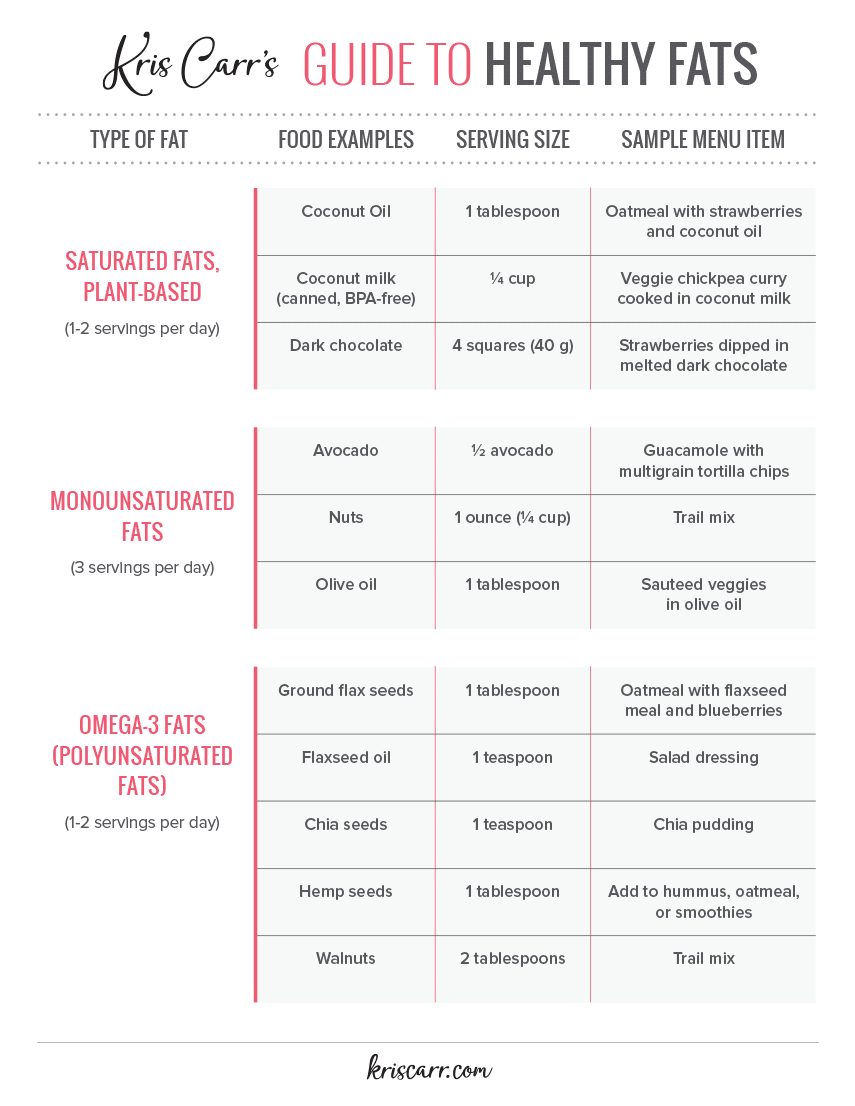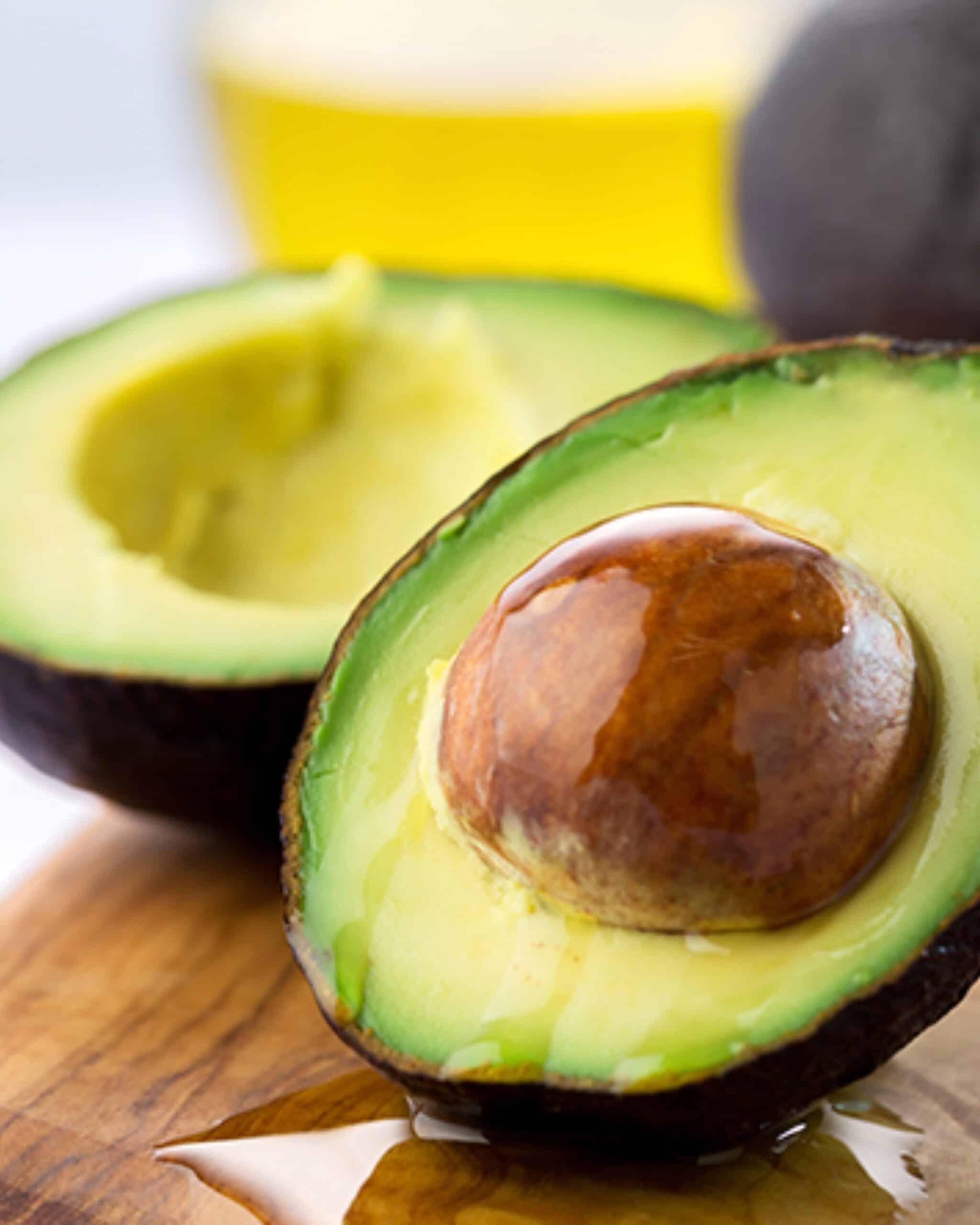Hiya Gorgeous,
I love healthy plant-based fats. There isn’t a salad in town I won’t top with avocado. I add almond butter to my smoothies, flax oil to my salad dressings and I’ve never turned down a square or two of very dark chocolate as a late-night treat. But there was a time in my life when I was really confused about fat. I knew French fries weren’t doing my health (or waistline) any good, but I thought that anything containing fat was a no-no. So, I assumed I could just reach for the fat-free Snackwells instead of the Oreos and go on my merry mad-for-junk-food way. Spoiler alert: I still felt like crap.
Today, I eat a variety of plant-based healthy fats and feel fabulous (we’ll get to the types of fats in just a moment). There are many benefits that come along with eating a diet that includes the right fats. Think glowing skin and shinier, stronger hair for starters. Plus, healthy fats help keep your weight where you want it and support brain health.
But before we all leave our jobs for avocado farming (though that would be fun!), let’s step back and talk about the different kinds of fats. Some are not-so-great for your health and some you just can’t live without. The good news is, if you eat the healthier fats and don’t overdo it on sugars and refined carbs, you’ll probably have an easier time maintaining a healthy weight. Not only will you be unlikely to gain weight, but healthy fats are likely to help you to stay slim!
- Trans fats (try to avoid these completely): By now it’s common knowledge that these fats have no health benefits and may actually be harmful. While there are some naturally occurring trans fats in dairy products, most of the trans fats in a standard diet are man-made. They’re made by taking healthy vegetable fats and adding hydrogen atoms to them. This saturated version of an otherwise healthy fat is more shelf-stable, which is why trans fats often appear in margarines, fried foods, cookies, cakes and other processed baked goods. Not only do trans fats cause an increase in “bad” LDL cholesterol levels, but they also work to decrease “good” HDL cholesterol (study).
- Saturated fats (try to eat these sparingly): These fats have generally been thought of as unhealthy, especially when it comes to heart disease risk. Although, not all types of saturated fats impact your health the same way. For example, saturated fats from animal products, such as butter, cheese and fatty meats, tend to increase cholesterol levels and cardiovascular disease risk (study), whereas the saturated fats in coconut oil, canned coconut milk (BPA-free cans, please!) and dark chocolate do not tend to have the same negative effect (study). So while adding some plant-based, unprocessed saturated fats to your diet may benefit your health, you probably want to avoid animal-based ones as much as possible.
- Monounsaturated fats: You’ll find these fats in foods like avocados, nuts and olive oil. They’ve been found to be beneficial in lowering breast cancer risk (study), lowering cholesterol levels (source), improving rheumatoid arthritis symptoms (study) and reducing belly fat (study).
- Polyunsaturated fats: These fats are found mostly in vegetable oils (corn, sunflower, safflower). Omega-3’s also fall into this category, and they are considered the healthiest and most essential fats on the block. You’ll find omega-3’s in foods like flaxseeds, hemp seeds, walnuts and chia seeds. They are considered essential because your body cannot make them and you must get them in your diet to reap the benefits. These benefits include improving heart health and decreasing risk of stroke (source). The omega-3’s are also important for building brain cells and for a healthy functioning nervous system (source).
Boost Your Health and Promote Weight Loss With Healthy Fats
Before we dive into shedding some unwanted pounds (if that’s your goal), let’s do a fat recap. The trans fats are goners—they don’t serve your health. On the other side of the coin, polyunsaturated essential fats are integral to your health, monounsaturated fats can be beneficial and even saturated plant-based fats have some redeeming qualities.
In order to maintain a healthy weight or lose weight (if desired), it’s important to get healthy fats into your diet while also reducing the amount of simple sugars and white carbs (aka Snickers bars and Wonder Bread). By replacing these sugars and carbs with healthy fats, you may have a much easier time managing your weight (study). Plus, fats trigger satiety and may prevent overeating because your food tastes better. Yum, yum, done.
Here’s a chart that gives you an idea of how much and how often to eat these healthy fats:

Hopefully you’re feeling more fat savvy and ready to integrate the beneficial ones into your diet. Whether you’re just looking to boost your health (prevention rocks) or shed some weight, fat can be your friend!
Your turn: What’s your favorite go-to healthy fat and how do you use it in your diet? I wanna know!
Peace & cashews,



I like this web site very much so much excellent information.
Hello kris
Thumbs up!
Your article is awesome and I would not hesitate to share on social media.
I have seen good reviews and testimonials on this product and I am just one step from ordering
https://bit.ly/2SOAChd
This is amazing information. This is helpful for me na nahihirapan sa pagtulog at nalilito sa kung anong vitamins ang i-take para maging healthy. But yes, having a healthy lifestyle is still the best answer
Well written about healthy fats and how it is helpful to maintain good health. Changing your unhealthy diet habits into healthy one will be one of those things which will help you to improve your lifestyle and will keep you away from health issue which occurs due to unhealthy food.
Hi Kris,
Thanks for sharing your healthy tips with us. From past one year, I also become a fitness lover due to my hyperpigmentation problem. Now I love to eat healthy food all the time. The tips you have mentioned in your blog are amazing. I definitely going to follow these tips in my diet plan too.